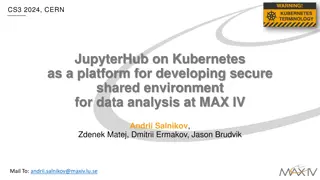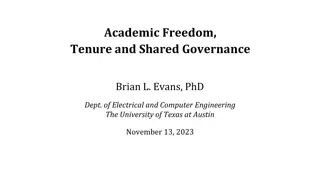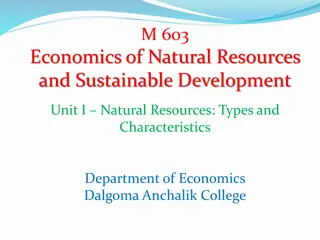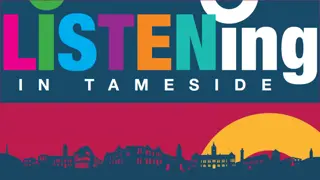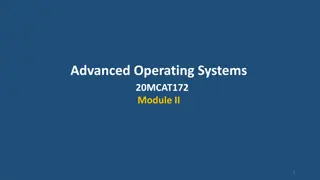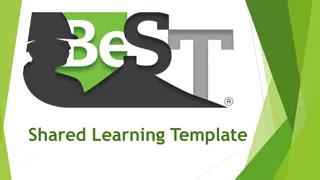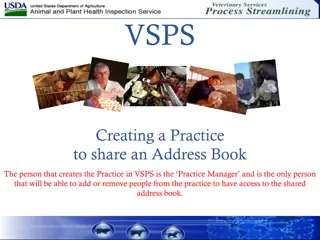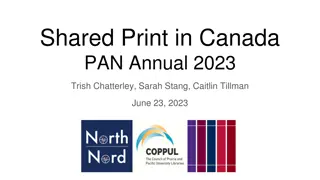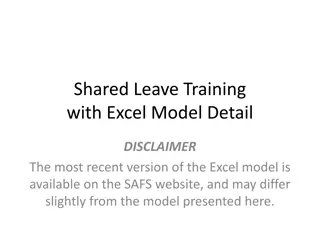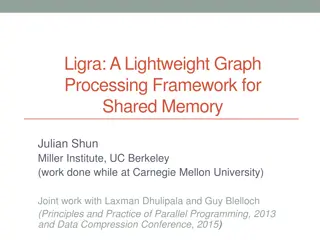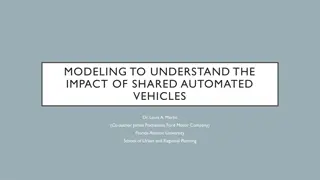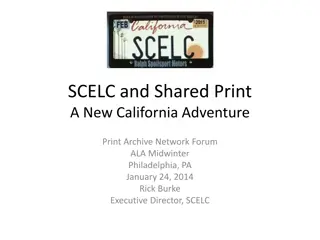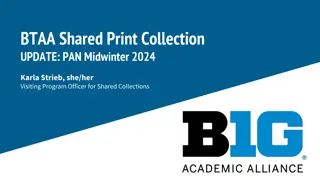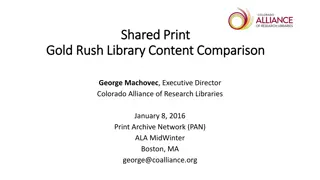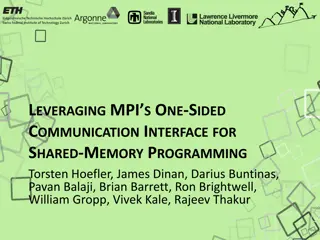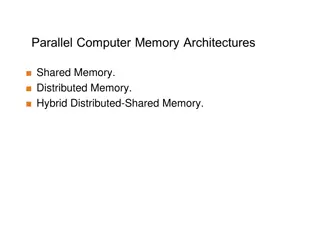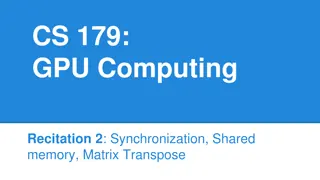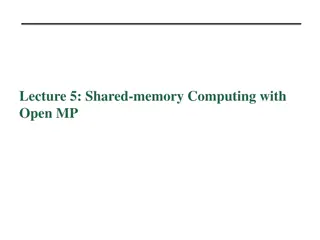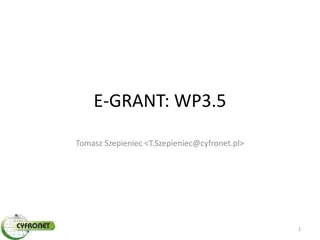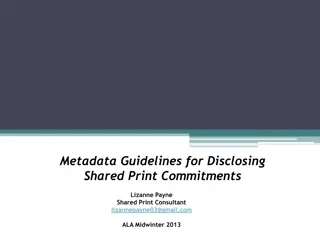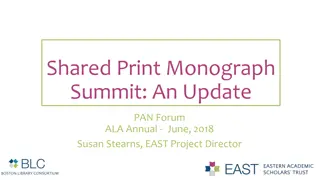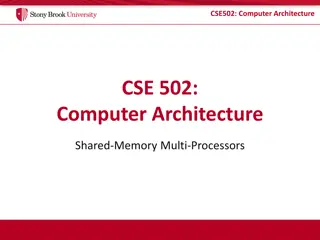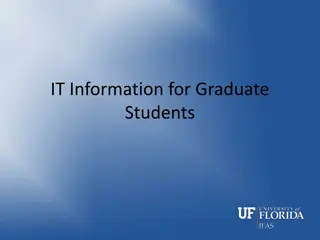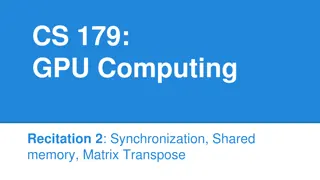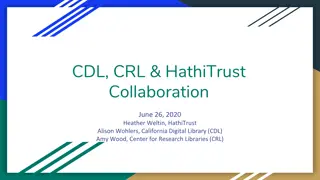Secure Shared Data Analysis Environment on Kubernetes at CERN
Develop a secure shared data analysis environment at MAX IV using CERN JupyterHub on Kubernetes. Utilize container images with custom kernels and manage resources efficiently, including GPU sharing. Integrate with existing LDAP credentials for seamless operation. Follow operational requirements with
3 views • 15 slides
Importance of Academic Freedom, Tenure, and Shared Governance in Higher Education
Academic freedom, tenure, and shared governance are crucial in higher education for fostering open inquiry, protecting faculty rights, and ensuring institutional integrity. Organizations like the American Association of University Professors (AAUP) advocate for these principles to uphold faculty aut
5 views • 9 slides
Food Security and Livelihoods Sector Meeting Response in Hatay
The Food Security and Livelihoods Sector meeting in Hatay covered various important topics such as action points, partner updates, 5W data analysis, and weekly reporting on assistance provided to beneficiaries. The meeting agenda included discussions on hot meal arrangements, coordination of agricul
1 views • 9 slides
Understanding Natural Resources and Resource Economics
Economics of natural resources focuses on the supply, demand, and sustainable allocation of the Earth's resources. It aims to develop a sustainable economy that protects natural resources for future generations. Natural resources are essential for human survival and include biotic and abiotic resour
0 views • 11 slides
Understanding Memory Allocation in Operating Systems
Memory allocation in operating systems involves fair distribution of physical memory among running processes. The memory management subsystem ensures each process gets its fair share. Shared virtual memory and the efficient use of resources like dynamic libraries contribute to better memory utilizat
1 views • 233 slides
Understanding Cladograms and Phylogenetic Analysis
Cladograms are used in cladistics to illustrate evolutionary relationships between organisms based on shared ancestral and derived characters. They are created by grouping species by common descent, forming clades that include an ancestral species and all its descendants. Valid clades are monophylet
0 views • 11 slides
Effective Strategies for Co-Production in Commissioning Process
Commissioning involves needs assessment, analysis, design planning, procurement, delivery, monitoring, and evaluation. Effective commissioning is person-centered, outcome-focused, inclusive, well-led, and promotes a diverse and sustainable market. Meeting needs through co-production is essential, in
0 views • 12 slides
Understanding Distributed Mutual Exclusion in Operating Systems
In distributed systems, the problem of mutual exclusion arises when multiple sites/processes need to access shared resources concurrently. Unlike in single-computer systems, distributed systems lack shared memory, leading to the need for communication-based approaches rather than shared variables li
0 views • 49 slides
Understanding Shared Memory Architectures and Cache Coherence
Shared memory architectures involve multiple CPUs sharing one memory with a global address space, with challenges like the cache coherence problem. This summary delves into UMA and NUMA architectures, addressing issues like memory latency and bandwidth, as well as the bus-based UMA and NUMA shared m
0 views • 27 slides
Enhancing Organizational Learning through BeSafe Taranaki Shared Learnings
BeSafe Taranaki Shared Learnings aims to facilitate cross-organizational learning by sharing insights from incidents and investigations. The focus is on identifying key lessons, target audiences, necessary process changes, and safety expectations. Two types of learnings are emphasized: Immediate Not
2 views • 9 slides
Creating a Shared Address Book in VSPS
Learn how to create a shared address book in VSPS by setting up a practice managed by the Practice Manager, who can add or remove users to access the address book. Follow step-by-step instructions to invite users and manage access to the shared address book efficiently.
0 views • 24 slides
Understanding Shared Memory Architectures and Cache Coherence
Shared memory architectures involve multiple CPUs accessing a common memory, leading to challenges like the cache coherence problem. This article delves into different types of shared memory architectures, such as UMA and NUMA, and explores the cache coherence issue and protocols. It also highlights
2 views • 27 slides
Shared Living Service Overview for Independent Living with Supports
The Shared Living Service, facilitated by Deanna L. Parker, MPA VA DBHDS, offers individuals aged 18 and above the opportunity to live independently with some support. This service is available under all three waivers and entails a one-to-one living arrangement where a roommate provides agreed-upon
0 views • 20 slides
Collaborative Shared Print Initiatives in Canadian Libraries: PAN Annual 2023
North/Nord initiative began in August 2021 to coordinate shared print efforts across Canadian libraries, focusing on Canadian materials. The program evaluation is set for Summer 2023, emphasizing collaboration for success. COPPUL SPAN expands on prioritizing partnerships, Indigenous publications, an
3 views • 5 slides
Addressing Water Management Challenges in Nile Basin for Sustainable Development Goals by 2030
Effective water management in the Nile Basin is crucial for achieving the Sustainable Development Goals by 2030. With a rapidly growing population and economy, shared water resources face challenges exacerbated by climate uncertainty. Implementing technical solutions requires enabling legal, policy,
1 views • 9 slides
Understanding the Key Articles of the Nagoya Protocol on Access to Genetic Resources and Benefit-Sharing
The Nagoya Protocol aims to promote fair sharing of benefits from genetic resources utilization for conservation efforts. It encompasses access, technology transfer, funding, and respect for rights over resources and technologies. The protocol applies to genetic resources, traditional knowledge, and
1 views • 19 slides
Understanding Citizenship: A Shared Identity and History
Explore the diverse perspectives on citizenship through respectful devotion to one's country or school. Discover what citizenship means to individuals in just six words and how it ties into shared histories and identities. Delve into the American Dream and the shared privilege it represents, emphasi
0 views • 18 slides
Excel Model for Shared Leave Training Detail
The Excel model for shared leave training detail allows school district employees to share leave both within and outside their district. The model facilitates the calculation of hourly salary rates and benefits for employees interested in participating in the shared leave program. The implementation
0 views • 12 slides
Strategies for Effective Partnership and Resource Pooling in Capacity Development
Strategies and approaches for pooling resources and working together in capacity development initiatives include shared services, strategic partnerships, joint delivery partnerships, and more. Selection of partners, planning shared goals, effective delivery, and managing risks are crucial for succes
0 views • 8 slides
Effective Strategies for Shared Reading in Non-Fiction Settings
Shared reading in non-fiction is an effective approach to reinforce literacy skills while teaching subject-specific content. Teachers choose texts that match students' reading levels, are cross-curricular, and engaging. Discussions, predictions, vocabulary exploration, and historical context are int
0 views • 22 slides
Understanding Natural Resources: Types and Conservation
Natural resources play a crucial role in sustaining life on Earth, encompassing elements like water, air, soil, minerals, and more. These resources can be classified into renewable and non-renewable categories, with the former being replenishable through natural cycles and the latter being finite an
0 views • 24 slides
Ligra: A Lightweight Graph Processing Framework for Shared Memory
Ligra is a lightweight graph processing framework developed by Julian Shun during his time at the Miller Institute, UC Berkeley. This framework, created in collaboration with Laxman Dhulipala and Guy Blelloch, is designed for shared memory systems to efficiently analyze large graphs. Key features in
0 views • 21 slides
Introduction to Boston University's Shared Computing Cluster
Boston University's Shared Computing Cluster (SCC) provides researchers with access to a high-performance computing environment for running code, collaborating on shared data, and utilizing specialized software packages. With over 800 nodes, 20,000 processors, and hundreds of GPUs, the SCC offers re
0 views • 63 slides
Impact of Shared Automated Vehicles on Transportation System Performance
This study by Dr. Louis A. Merlin and James Fischelson explores the potential impact of shared automated vehicles on transportation systems. By reviewing 39 papers and simulations, the research delves into the implications of new shared automated modes, such as automated taxis, shuttles, and shared
0 views • 38 slides
SCELC Shared Print Feasibility Study Overview
Explore the goals and challenges of the SCELC Shared Print Feasibility Study, focusing on understanding member readiness, collection analysis, sustainability proposals, user behaviors, and cost analysis. The study aims to develop shared print programs to preserve and share print materials among dive
0 views • 12 slides
Transforming Big Ten Libraries through Shared Print Collections and Collective Action
Aspiration for a tremendous vision to unite Big Ten university collections into one shared and fully networked "BIG Collection." This initiative aims to increase findability, usability, and value at scale while deepening interdependence and resilience for an uncertain future. The Knowledge Commons w
1 views • 10 slides
Debate on Shared Sanitation: Improved or Not?
The discussion revolves around the classification of shared sanitation as improved or unimproved. WHO and UNICEF have a classification system where shared sanitation is considered unimproved due to concerns about cleanliness and accessibility. A proposed policy change by JMP seeks to include shared
0 views • 22 slides
Alliance Shared Print Program Overview
Colorado Alliance of Research Libraries established the Alliance Shared Print program focusing on distributed print repositories. The program allows libraries to voluntarily participate, maintain their holdings, and retain materials on behalf of the group. Key features include flexibility, no centra
0 views • 21 slides
Leveraging MPI's One-Sided Communication Interface for Shared Memory Programming
This content discusses the utilization of MPI's one-sided communication interface for shared memory programming, addressing the benefits of using multi- and manycore systems, challenges in programming shared memory efficiently, the differences between MPI and OS tools, MPI-3.0 one-sided memory model
0 views • 20 slides
Understanding Shared Memory, Distributed Memory, and Hybrid Distributed-Shared Memory
Shared memory systems allow multiple processors to access the same memory resources, with changes made by one processor visible to all others. This concept is categorized into Uniform Memory Access (UMA) and Non-Uniform Memory Access (NUMA) architectures. UMA provides equal access times to memory, w
0 views • 22 slides
GPU Computing and Synchronization Techniques
Synchronization in GPU computing is crucial for managing shared resources and coordinating parallel tasks efficiently. Techniques such as __syncthreads() and atomic instructions help ensure data integrity and avoid race conditions in parallel algorithms. Examples requiring synchronization include Pa
0 views • 22 slides
Shared-Memory Computing with Open MP
Shared-memory computing with Open MP offers a parallel programming model that is portable and scalable across shared-memory architectures. It allows for incremental parallelization, compiler-based thread program generation, and synchronization. Open MP pragmas help in parallelizing individual comput
0 views • 25 slides
E-GRANT: Resource Allocation Tool Features and Development
E-GRANT is an advanced resource allocation tool developed by EGI-Engage for efficiently managing resources allocation for projects related to computing, storage, and VMs. The tool allows customers to send requests, negotiate resources, sign SLAs, and view allocations. It also enables resources provi
0 views • 5 slides
Leveraging Resources in FY 2021 IHBG Competitive Grant Application
The FY 2021 IHBG Competitive Grant Application emphasizes Leveraging Resources as Rating Factor 4, where applicants can earn up to 5 points based on the percentage of leveraged resources relative to project costs. Firm commitments through cash or in-kind donations are encouraged, with examples inclu
0 views • 31 slides
Metadata Guidelines for Disclosing Shared Print Commitments
Shared Print Metadata Guidelines aim to establish new Shared Print Institution Symbols and add them to bibliographic records for resource sharing. These guidelines involve creating MARC Local Holdings Records (LHRs) to document archiving commitments for journals. The Shared Print initiative supports
1 views • 12 slides
Shared Print Monograph Summit: Progress and Future Directions
The Shared Print Monograph Summit held in June 2018 focused on collaboration and coordination among North American shared print programs. Key priorities included open data on retention commitments, research on risks, establishing community standards, and more. Working groups were formed to address o
0 views • 24 slides
Understanding Computer Architecture: Shared Memory Systems
Shared memory multiprocessors in computer architecture involve multiple threads using shared memory for communication, with synchronization complexities and implicit communication challenges. Despite these drawbacks, Shared Memory Systems have proven to be successful machines due to their evolutiona
0 views • 40 slides
IT Information and Resources for Graduate Students
IT Department at the University of Florida offers support to graduate students in various areas including software availability, equipment borrowing, network access, and resources. Graduate students can access software such as Microsoft Office 365 ProPlus for free and borrow equipment like laptops a
0 views • 10 slides
Synchronization and Shared Memory in GPU Computing
Synchronization and shared memory play vital roles in optimizing parallelism in GPU computing. __syncthreads() enables thread synchronization within blocks, while atomic instructions ensure serialized access to shared resources. Examples like Parallel BFS and summing numbers highlight the need for s
0 views • 21 slides
Collaboration for Shared Print Collections: Vision, Mission, and Principles
This collaboration between HathiTrust, CDL, and CRL aims to enhance access to shared print collections, promote equity in scholarly resources, and leverage networks for collaborative infrastructure. The vision includes embedding shared print in library collections, enriching the scholarly record, an
0 views • 10 slides
